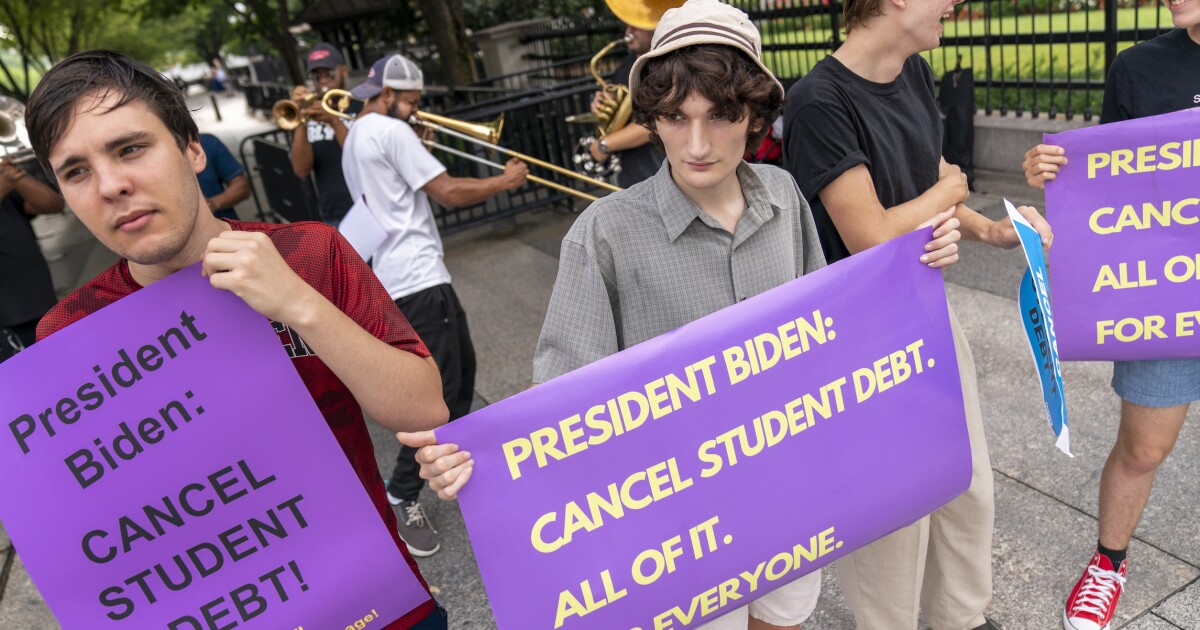

President Joe Biden is keeping the suspense high over the latest student loans “pause” deadline, making no decision public with just two weeks left before payments and interest are due to resume on Sept. 1.
White House officials have said they expect the 30-month-old student loans pause to be extended beyond the midterm elections or for Biden to announce he’d shift $10,000 per borrower of debt to taxpayers, but neither action has happened yet.
REPUBLICANS CRY FOUL OVER WHITE HOUSE STAFFERS WITH MILLIONS IN STUDENT LOANS
“The president spoke to this when he was asked, I think about two weeks ago, about the student loan and his decision,” White House press secretary Karine Jean-Pierre said on Aug. 9 in response to a reporter’s question. “He said by the end of August. So we’re still kind of at the beginning, getting into the middle of August. So when he’s ready to make that decision, we will let you know.”
Former President Donald Trump introduced the pause in March 2020 amid pandemic lockdowns and extended it twice before leaving office. Biden has so far extended it four more times and is expected to do so again to move the deadline beyond the fall midterm elections.
But he’s never gotten this close to a deadline before. When loan repayments were set to be extended on May 1, Biden announced an extension on April 5. When payments were set to restart last September, the extension announcement came in early August.
This time is also different in another way. Then-White House press secretary Jen Psaki, back in April, teased an announcement by the White House of “canceling” some loans completely, which would be a blockbuster move so close to the midterm elections.
“Between now and Aug. 31, [the freeze on payments] is either going to be extended or we’re going to make a decision, as [White House chief of staff] Ron [Klain] referenced, about canceling student debt,” she said. The figure most commonly tossed out is $10,000 per borrower, though some legislators and groups like the NAACP are calling for $50,000 or higher.
More than 100 Democratic lawmakers sent a letter to Biden and Education Secretary Miguel Cardona on July 28 urging them to extend the pause for a seventh time, citing COVID-19 as the reason — even as most pandemic-related policies have long expired.
“Low-income borrowers, black and brown borrowers, and women borrowers still face severe financial hardships as COVID-19 continues to infect individuals throughout the country and exacerbate existing inequities,” the letter reads. “Moreover, resuming student loan payments at this moment would further complicate administrative actions already underway or contemplated by the department —which could contribute to unnecessary confusion for borrowers in the upcoming months.”
Student loan servicing contractors for the federal government are reportedly being told to hold off on sending out billing statements as the deadline looms, possibly signaling an extension is to come. But loan forgiveness advocates argue that the uncertainty surrounding the pause hangs over borrowers both economically and psychologically.
On the other hand, Republicans are crying foul over many aspects of the policy and predicting a voter backlash because only 13% of the public has student loans.
A group of House Republicans has raised ethics concerns over White House staffers who may be encouraging the president to clear student loans while holding as much as $4.7 million in student loans themselves — a possible conflict of interest.
The group, led by Reps. James Comer (R-KY), the ranking member of the Committee on Oversight and Reform, and Virginia Foxx (R-NC), the ranking member of the Committee on Education and Labor, penned a letter to Office of Government Ethics Director Emory Rounds in June outlining its concerns.
Richard Painter, a University of Minnesota law professor and the chief ethics lawyer for then-President George W. Bush from 2005 to 2007, said the issue could be not just unethical but criminal as a violation of 18 U.S.C. 208.
Rounds responded to the GOP congressmen later in June, saying that “other than waivers sought by an agency to allow an individual to work on a matter that poses a potential conflict, OGE does not have access to documents or information about the work assignments individuals have in support of an administration’s policies.”
A spokesman for Comer’s office said it appears that Rounds’s office is not in possession of any waivers related to student loan forgiveness. That came as no surprise to Painter.
CLICK HERE TO READ MORE FROM THE WASHINGTON EXAMINER
“They are just assuming there is no conflict of interest for White House staffers advising the president on forgiveness of their own loans,” he said.






